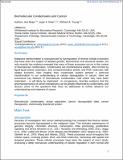Biomolecular Condensates and Cancer
Author(s)
Boija, Ann; Klein, Isaac A.; Young, Richard A.
DownloadAccepted version (12.11Mb)
Publisher with Creative Commons License
Publisher with Creative Commons License
Creative Commons Attribution
Terms of use
Metadata
Show full item recordAbstract
Malignant transformation is characterized by dysregulation of diverse cellular processes that have been the subject of detailed genetic, biochemical, and structural studies, but only recently has evidence emerged that many of these processes occur in the context of biomolecular condensates. Condensates are membrane-less bodies, often formed by liquid-liquid phase separation, that compartmentalize protein and RNA molecules with related functions. New insights from condensate studies portend a profound transformation in our understanding of cellular dysregulation in cancer. Here we summarize key features of biomolecular condensates, note where they have been implicated—or will likely be implicated—in oncogenesis, describe evidence that the pharmacodynamics of cancer therapeutics can be greatly influenced by condensates, and discuss some of the questions that must be addressed to further advance our understanding and treatment of cancer.
Date issued
2021-02Department
Massachusetts Institute of Technology. Department of BiologyJournal
Cancer Cell
Publisher
Elsevier BV
Citation
Boija, Ann et al. "Biomolecular Condensates and Cancer." Cancer Cell 39, 2 (February 2021): 174-192. © 2020 Elsevier Inc
Version: Author's final manuscript
ISSN
1535-6108